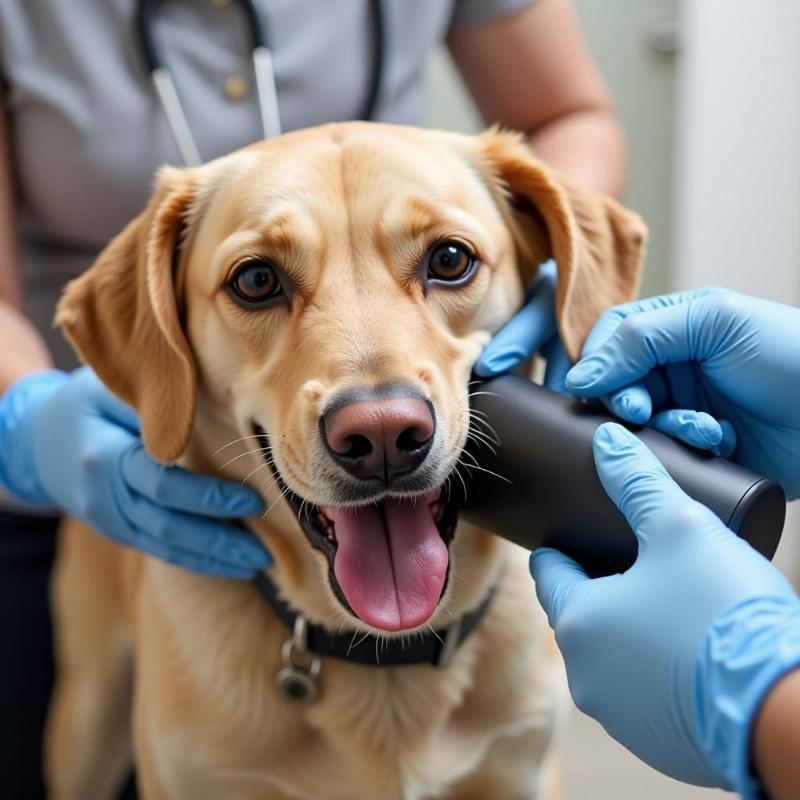If you’ve ever heard your dog’s jaw click when yawning, you’ve probably wondered if it’s something to be concerned about. While a clicking jaw isn’t always a cause for alarm, it’s important to understand the potential reasons behind it and when it might warrant a visit to the vet. This article will delve into the common causes of jaw clicking in dogs, how to identify potential problems, and what steps you can take to ensure your furry friend’s comfort and well-being.
Temporomandibular joint (TMJ) disorders are a frequent culprit behind jaw clicking in dogs. The TMJ connects the lower jaw to the skull, enabling crucial movements like chewing and yawning. Inflammation, injury, or even developmental issues can disrupt the smooth operation of this joint, leading to audible clicks or pops. Arthritis, a common ailment in older dogs, can also contribute to TMJ issues. The degeneration of cartilage within the joint can cause friction and clicking sounds.
Another potential cause of jaw clicking is simply the natural movement of the jawbone as the dog yawns. Just like in humans, a slight pop or click can occur as the ligaments and tendons stretch. This type of clicking is usually infrequent and not accompanied by any pain or discomfort. However, if the clicking becomes persistent, or if your dog exhibits signs of pain or difficulty eating, it’s crucial to seek veterinary advice.
Understanding the Causes of Jaw Clicking
Beyond TMJ disorders and normal jaw movement, several other factors can contribute to jaw clicking in dogs. Dental problems such as misaligned teeth, fractured teeth, or gum disease can also cause clicking or popping sounds during yawning or chewing. In some cases, a foreign object lodged in the mouth can interfere with jaw movement and produce clicking.
Trauma to the jaw, such as a fall or impact, can lead to fractures or dislocations that cause clicking. While less common, tumors or cysts in the jaw area can also contribute to this issue. Finally, certain neurological conditions can affect the muscles and nerves controlling jaw movement, potentially resulting in clicking or other unusual jaw movements.
When to Seek Veterinary Care
It’s important to differentiate between occasional, painless jaw clicking and clicking accompanied by other symptoms. If your dog displays any of the following signs, consult a veterinarian promptly:
- Persistent or frequent jaw clicking
- Pain or discomfort when yawning or chewing
- Difficulty opening or closing the mouth
- Swelling around the jaw
- Changes in eating habits
- Excessive drooling
- Reluctance to play with toys
- Facial asymmetry
Caring for Your Dog’s Jaw Health
Maintaining good oral hygiene is crucial for preventing dental issues that can contribute to jaw clicking. Regular brushing, dental chews, and professional cleanings can help keep your dog’s teeth and gums healthy. Providing a balanced diet and avoiding hard toys or bones can also protect the jaw from injury.
What Your Veterinarian Will Do
Your veterinarian will perform a thorough physical examination, focusing on the jaw and surrounding tissues. They may also recommend diagnostic tests such as X-rays or CT scans to evaluate the TMJ and identify any underlying conditions. Treatment will depend on the specific cause of the clicking and may include pain medication, anti-inflammatory drugs, or even surgery in severe cases.
 Dog Receiving Jaw Treatment
Dog Receiving Jaw Treatment
Conclusion
While the occasional jaw click when yawning is often harmless, persistent clicking or clicking accompanied by other symptoms should be evaluated by a veterinarian. Early diagnosis and treatment can help prevent complications and ensure your dog’s long-term comfort and well-being. By paying attention to your dog’s jaw health and seeking professional advice when needed, you can help your furry friend live a happy and pain-free life.
FAQ
-
Is jaw clicking always a sign of a serious problem? No, occasional jaw clicking can be normal, especially during yawning. However, persistent clicking or clicking accompanied by other symptoms should be checked by a vet.
-
What can I do to prevent jaw problems in my dog? Maintaining good oral hygiene, providing a balanced diet, and avoiding hard toys or bones can help protect your dog’s jaw health.
-
What kind of treatment might my dog need for jaw clicking? Treatment depends on the underlying cause and can range from pain medication and anti-inflammatory drugs to surgery in severe cases.
-
How can I tell if my dog is experiencing jaw pain? Signs of jaw pain include difficulty eating, excessive drooling, reluctance to play with toys, and changes in behavior.
-
Can TMJ problems be cured in dogs? While some TMJ issues can be managed with medication and lifestyle changes, others may require surgery. The prognosis depends on the severity and underlying cause.
-
Are certain breeds more prone to jaw problems? Yes, some breeds are predisposed to certain jaw conditions. Your veterinarian can provide more information about breed-specific risks.
-
What should I do if my dog’s jaw is swollen? Jaw swelling can be a sign of a serious problem and requires immediate veterinary attention.
Beautdogs.us is your premier resource for all things dog-related in the US. We offer expert advice on dog breeds, care, and lifestyle, providing valuable insights for both novice and experienced dog owners. From understanding your dog’s quirky habits like jaw clicking to finding the perfect products for their needs, Beautdogs.us is here to help you navigate the wonderful world of dog ownership. For expert advice or product recommendations, contact us at [email protected] or +1 501-555-7529. Visit Beautdogs.us today for comprehensive and trustworthy information on all things dog!